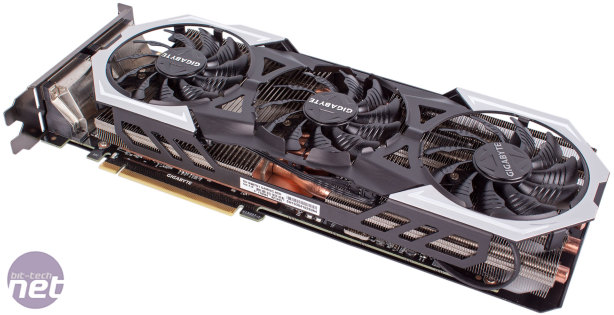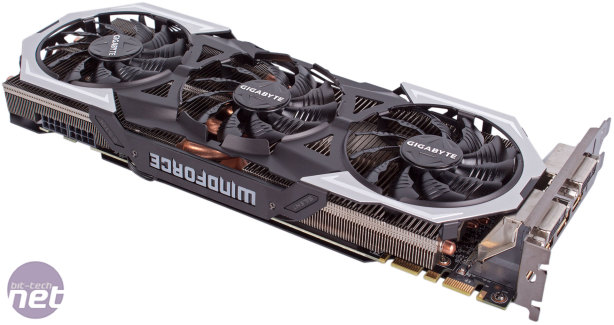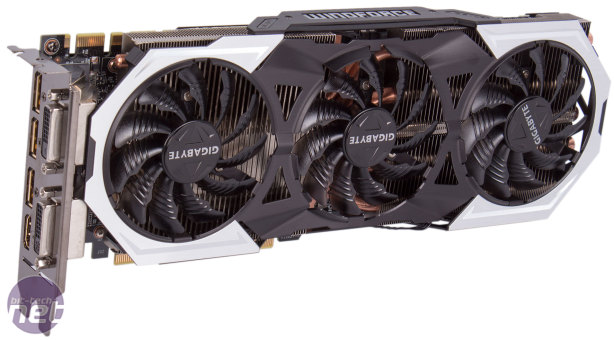Performance Analysis
Other custom GTX 980 Ti cards we've seen include the MSI Gaming model, which has very similar clock speeds to Gigabyte's OC Mode as well as a slight bump in memory frequency, and the Asus Strix one, which is even faster on both counts. In Alien: Isolation, this G1 Gaming card places in between the MSI and Asus models, though the difference between the three is never a lot in any of our games; rarely more than a couple of frames per second, in fact. In this game, the Gigabyte card is easily smooth enough, even at 4K with maximum settings, where its minimum frame rate is just shy of 60fps.In Battlefield 4, it trumps the MSI by 1 or 2fps but the Asus Strix card does just that to the Gigabyte card. Again, it's able to sustain smooth frame rates no matter what, though we do disable anti-aliasing at 4K here.
In Crysis 3, the OC Mode allows the G1 Gaming to just pip the Asus card to the top spot in the chart at 1440p with a 1fps faster minimum. These two cards are also the only ones we've ever seen that can sustain 30fps at 4K.
In GTA V at 1440p, the Gigabyte GTX 980 Ti G1 Gaming has a minimum frame rate below even the reference GTX 980 Ti, though this is more likely down to a CPU limit as the built-in benchmark is randomly generated in parts. The average frame rate is right where you'd expect it and at 4K it returns to sitting between the MSI and Asus cards in the charts with a smooth minimum of 53fps. This positioning also holds true in both Middle Earth and The Witcher 3, and in both of these games it's also very playable at 4K with the near maximum settings we use.
Across the full suite of games, Gigabyte manages to beat the reference GTX 980 Ti by 11 percent at 1440p and 15 percent at 4K on average. Compared to the AMD Radeon R9 Fury X, it does even better, winning by 24 percent and 16 percent at the same resolutions respectively.
Unigine Valley shows us just how small the differences are between the three custom GTX 980 Ti cards. The Asus Strix model beats this card in OC Mode by less than 1 percent, and in turn Gigabyte only holds a 1-2 percent advantage over MSI. More significantly, it beats a reference GTX 980 Ti by 15 percent.
While the GTX 980 Ti G1 Gaming does munch through more power than the reference card, this is to be expected given the hefty overclock and trio of fans. Thankfully, it isn't too big a difference, and it ends up being the least power hungry next to the offerings from Asus and in particular MSI. It's also the coolest of the three by 5°C, managing a delta T of just 49°C. However, it does appear to use a more aggressive fan profile than its competition, which we've seen from Gigabyte before. The end result is that the three fans are audible after sustained load, peaking at around 60 percent (just over 2,100 RPM) in our testing. Even so, it's a clear improvement over the reference design and there's easily breathing room for you to cap the fan speed.
When overclocking, we managed higher base and memory clocks than any of the other GTX 980 Ti models we've seen. The observed performance increase of 7-10 percent allows the Gigabyte GTX 980 Ti G1 Gaming to jump to the top of the charts. The difference between it and the other cards when they're also overclocked is admittedly extremely slim, but a top result is still a top result, and it did not come at the cost of higher temperatures or noise either.
Conclusion
There truly is very little to dislike about this graphics card. It has exceptionally high build quality all round, is extremely fast out of the box and able to go significantly faster still with some manual tinkering. Overclocked, it was up to 25 percent quicker than a reference card, which is seriously impressive. Add in the customisable LED backlit logo, the semi-passive fans and the extra DVI port for good measure and you have a drool-worthy package indeed.With its hefty factory overclock, the Gigabyte GTX 980 Ti G1 Gaming stomps all over the R9 Fury X, and while it can get a touch loud (relative to its competitors at least) there's ample leeway to cap the fan speed without running into any issues beyond slightly lowered boost performance. We also would have liked to see overclocked memory but really we're just being picky – significant memory overclocks are very rare out of the box and as the results show the card clearly isn't hampered through sticking to stock frequencies. We've seen some crazy pricing for this card, with one website even having it for less than £500, which is a great deal. However, even at £570, a more typical price, this GTX 980 Ti is sure to be a compelling offer for high-end gamers, given all that it offers over the £500 reference model.

-
Performance39 / 40
-
Features28 / 30
-
Value22 / 30


MSI MPG Velox 100R Chassis Review
October 14 2021 | 15:04












Want to comment? Please log in.